Watch or listen here as Chris Middlebrook talks about his printed circuit board fabrication class at Michigan Tech.
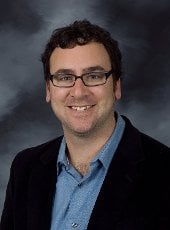
Timothy C. Havens (ECE), the William and Gloria Jackson Associate Professor of Computer Systems, has been named director of the Institute of Computing and Cybersystems (ICC), effective immediately.
The ICC is the research arm of the Alliance for Computing, Information and Automation, and one of several research centers at Michigan Tech organized under the authority of the Office of the Vice President for Research. It brings together some 50 Michigan Tech faculty members from 12 different academic units on campus, collaborating in the areas of cyber-physical systems, cybersecurity, data sciences, human-centered computing and scalable architectures and systems. Since its inception in 2015, it has hosted 28 funded projects, and was responsible for approximately $1.8M in external research expenditures in FY18.
As the Jackson Associate Professor, Havens holds a joint appointment in the Department of Electrical and Computer Engineering and the Department of Computer Science. He is also director of the interdisciplinary master of science program in data science. His technical areas of expertise are machine learning, computational intelligence, data science, and signal and image processing.
Havens was selected to lead the ICC by Provost and Vice President for Academic Affairs Jacqueline Huntoon and Vice President for Research David Reed, following an internal nomination and recommendation process organized by ICC Co-Director and ECE Department Chair Daniel R. Fuhrmann. Havens’ term as ICC director extends through Dec. 31, 2021.
Says Havens, “I am thrilled to be named the next director of the ICC and very much look forward to working with the entirety of the ICC membership and our connected communities to promote research and learning experiences in the areas of computing and cybersystems at Michigan Tech. I am enthused by the prospects of our ICC vision.”
By Daniel R. Fuhrmann.

Online Engineering Programs recognizes Professor Bruce A. Mork as one of the most highly skilled educators in the area of power systems engineering. Mork teaches electrical and computer engineering at Michigan Tech, where he was named the Dennis Wiitanen Professor of Electric Power Systems. Currently, his areas of interest include smart grids, power system protection, computer simulation, transients in electrical power systems, nonlinear dynamics and chaos theory, magnetic materials and saturation of transformers, power quality, photovoltaics, and renewable energy, including wind energy and solar energy.
Read more at Online Engineering Programs.
Michigan Tech offers an online Master’s in Electrical Engineering with a focus on power systems.
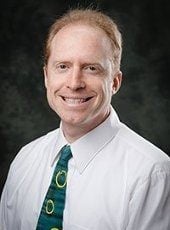
Joshua Pearce (MSE/ECE) gave an invited talk on “How to Eviscerate Lab Costs: Advances in Materials, Electronics and 3-D Printing for Scientific Equipment” for the Industrial Engineering program at the University of Trento, Trento Italy, last Wednesday, (Feb. 21, 2018).
Notables
Red Hat, a $2.9 billion per year open-source software company, honored Joshua Pearce (MSE/ECE) as one of eight instructors globally who champion open source education. Read more here.
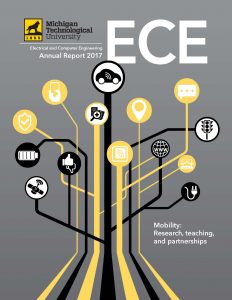 We are happy to share with you our newly released ECE Annual Report 2017. A look back at our past year highlights research activities from nine of our faculty members in the area of mobility, along with graduate students Mojtaba Bahramgiri, Derek Chopp, and Mehdi Jafari. We share in the good news received during the year in which three of our assistant professors received major early career awards: Lucia Gauchia and Zhaohui Wang received National Science Foundation CAREER awards and Jeremy Bos received the US Air Force Young Investigator Program award. We highlight two of our many outstanding undergraduate students, Brian Flanagan and Casey Strom, for accomplishments and contributions during their BS degree studies. This May we celebrated the 50th anniversary of the first female graduate of the Michigan Tech EE department, Pat Anthony. Pat was honored by the University during spring commencement and was also inducted into the ECE Academy. Once again the year included a wide variety of hands-on student projects in our Senior Design and Enterprise programs and we thank our sponsors for making it all possible! We invite you to read about these stories and more. From all of us at ECE, happy holidays and best wishes for 2018!
We are happy to share with you our newly released ECE Annual Report 2017. A look back at our past year highlights research activities from nine of our faculty members in the area of mobility, along with graduate students Mojtaba Bahramgiri, Derek Chopp, and Mehdi Jafari. We share in the good news received during the year in which three of our assistant professors received major early career awards: Lucia Gauchia and Zhaohui Wang received National Science Foundation CAREER awards and Jeremy Bos received the US Air Force Young Investigator Program award. We highlight two of our many outstanding undergraduate students, Brian Flanagan and Casey Strom, for accomplishments and contributions during their BS degree studies. This May we celebrated the 50th anniversary of the first female graduate of the Michigan Tech EE department, Pat Anthony. Pat was honored by the University during spring commencement and was also inducted into the ECE Academy. Once again the year included a wide variety of hands-on student projects in our Senior Design and Enterprise programs and we thank our sponsors for making it all possible! We invite you to read about these stories and more. From all of us at ECE, happy holidays and best wishes for 2018!
Tim Havens (ECE/CS) and Tony Pinar (ECE) published “Measures of the Shapley Index for Learning Lower Complexity Fuzzy Integrals” in Granular Computing and “Efficient Multiple Kernel Classification Using Feature and Decision Level Fusion” in IEEE Transactions on Fuzzy Systems, December 2017.
https://doi.org/10.1007/s41066-017-0045-6
Havens presented a paper co-authored by Pinar entitled “Generating Random Fuzzy (Capacity) Measures for Data Fusion Simulations” at the IEEE Symposium Series on Computational Intelligence (IEEE SSCI 2017) in Honolulu, HI, from Nov. 27 to Dec 1, 2017.

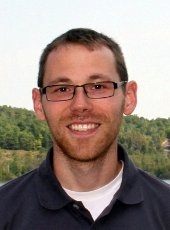

For many students and instructors, the upcoming weeks are the most motivationally challenging of the academic year. Days are getting shorter, colder and darker with six solid weeks of class behind us and four more weeks ahead before a break.
But Michigan Tech’s terrific faculty routinely provide me with inspiration to keep me focused. I want to share a story I play back in my head on tougher days in hopes that it will inspire you too.
When I first became the CTL director, Glen Archer, principal lecturer and associate chair in Electrical and Computer Engineering, used to do me the favor of speaking near the end of Graduate Teaching Assistant (GTA) orientation each fall. Glen would remind the GTAs that they were going to be the “maximum in the room.”
What he meant was that any students would almost certainly reflect and rise only to the level of enthusiasm and motivation set by their instructor. Glen was challenging them to set that bar high.
Glen’s advice helps me focus on bringing my best self into the classroom, even on days when I’m distracted by non-teaching or personal business, teaching material I don’t find that interesting myself, or just plain tired. It helps me see that if I’m not leading the way with interest and enthusiasm, it’s pretty hard to expect that my students will follow.
On Nov. 30, Glen will be recognized with the final 2017 CTL Teaching Award for Excellence in Large Class Teaching. He’ll share other stories as part of this event; I encourage you to mark your calendar now so that you can attend and hear more words of wisdom from this terrific teacher.
If you’d like to talk more about ways to keep yourself and students motivated, stop into the William G. Jackson Center for Teaching and Learning.
From Terrific Teaching at Tech, by Mike Meyer, William G. Jackson CTL.
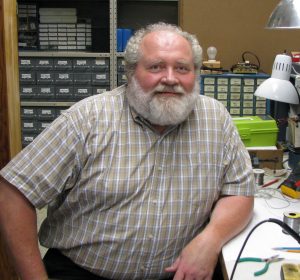
Feliz Cinco de Mayo from sunny Houston, Texas, where I am attending the spring off-site meeting of the College of Engineering External Advisory Board. Many thanks to board member Paul Dean for hosting us here at his facility at Dow Chemical. After our business meeting wraps up today, we will take part in an alumni social event for all Houston-area Huskies at a nearby restaurant.
Today is the last day of the “academic year pay period” which extends from two weeks before classes start in the fall, to one week after they end in the spring. Officially that means that, at Michigan Tech, summer starts next week. (There is a little cruel irony here in that we don’t even have leaves on our trees yet, but that will come shortly.) This is a good time for us to take stock of how we did over the past year, and taking a look at next year. We had our last faculty meeting of the year on Tuesday, and I made just such a report, which I will summarize here.
Congratulations to Assistant Professors Lucia Gauchia, Zhaohui Wang, and Jeremy Bos, on being reappointed to new two-year terms. Profs. Gauchia and Wang are entering their third term (years 5-6) and Prof. Bos is entering his second (years 3-4).
The past academic year, including Summer 2016, Fall 2016, and Spring 2017, we graduated 10 PhD students, 121 MS students, and 133 BS students. These numbers are up for us in all categories, especially for the graduate students. We are proud of all our graduating students, and wish them the best as they begin their careers. For next year we have 190 deposits for new undergraduate students, so we could be looking at yet another increase in undergraduate enrollment, even after our 8% growth this year. The data I have make it very difficult to predict the graduate enrollment for next year, so I am not even going to venture a guess on that one.
In talking about the teaching program, I always like to point out faculty members who do a great job in the classroom. One of the calculations I do involves student course evaluations and class sizes simultaneously. Without going into the details of the arithmetic, some faculty members who come out very well by that metric are Glen Archer, Mike Roggemann, Ashok Ambardar, and Lucia Gauchia. Looking at student course evaluations alone, for the smaller to medium-size classes, I see outstanding performance from Ashok Ambardar, Aurenice Oliveira, and Kit Cischke for undergraduate classes, and Sumit Paudyal, Mike Roggemann, and Lucia Gauchia for graduate classes.
We graduated 10 PhD students this year, which exactly meets our target of 10 per year, or 30 over the 3-year strategic planning period. The total over the past three years was 19, so the latter target was not met. However, looking ahead I count 3 PhD students who have already defended their dissertation but did not graduate for one reason or another, and 3 more that are defending in May. So, our PhD students are moving through the pipeline, and that is a good sign.
My projection for the research expenditures in ECE Department for this fiscal year, ending on June 30, is $2.0M. If that is correct, it will be down from $2.45M last year, but about average for us over the past few years. This is on the low side relative to our peers, for our size faculty and PhD program, and something that we continue to work on. One can reasonably ask why we even report such statistics, since the funding is not nearly as important as the quality and the impact of the work. The answer is (or my answer is) that dollars are fungible; everyone knows what a dollar is and what it is worth. The research expenditures in a department are a very simple “proxy metric” for the size of the research program, and all deans and department chairs report them (at least when we are talking to each other – read into that what you want.) The quality and impact of the work, as important as it is, is much harder to quantify. One argument is, if you can convince someone to pay for it then the work must be important. Ultimately the reputation of the department and the individual faculty members is based on intellectual and scholarly contributions, but such reputations take a long time to develop. So, for reporting short-term results research expenditures continue to be the easy way out.
A few other acknowledgements are in order:
Kudos to Assistant Professors Lucia Gauchia and Zhaohui Wang on their NSF CAREER awards, and to Assistant Professor Jeremy Bos for both his AFOSR Young Investigator Award and for leading the effort to get us into the GM/SAE AutoDrive Challenge. I wrote extensively about all of this in an earlier post but it bears repeating.
Prof. Bruce Mork simultaneously had the most research expenditures this fiscal year and taught very large graduate courses in power systems. Bruce’s graduate course in power system protection in the semester that just ended had nearly 100 students, which could be classified as a success disaster were it not for the fact that he manages it very well (and we threw a lot of graduate TAs at the laboratory sections). Many thanks to Bruce to setting an example in research funding and attracting MS students to the department.
Associate Chair Glen Archer was recognized in the Dean’s Teaching Showcase for his outstanding work in EE3010, our “service” course in electronic circuits and instrumentation for non-majors, his guidance as the faculty advisor for both the Blue Marble Security Enterprise and Robotics System Enterprise, and his service as the supervisor for all the lab TAs in the department. Glen is indispensable to me personally in all matters of departmental administration, and is totally committed to the success of the ECE Department. It is a pleasure to work with him.
Prof. Shiyan Hu is leading the way in departmental visibility in the area of professional service. He led the establishment of a new IEEE Technical Committee on Cyber-Physical Systems; he is the co-Editor-in-Chief of the new IET Journal on Cyber-Physical Systems; he has established two new IEEE workshops; he is an Associate Editor for three IEEE Transactions. As we grow the department activity in the areas of robotics, control, and automation, this recognition on the national and international scene in cyber-physical systems is extremely valuable, and I thank Shiyan for all his hard work.
Most years I like to recognize an individual departmental staff member for outstanding service. This year I just want to make the point that our entire staff, those with office, technical, and advising responsibilities, do a fantastic job and work well together as a team to move the department forward. Many thanks to Lisa Hitch, Michele Kamppinen, Joan Becker, Judy Donahue, Trever Hassell, Chito Kendrick, Chuck Sannes, and Mark Sloat for everything you do.
Finally, this week we are saying goodbye to Professor of Practice Duane Bucheger, who is leaving after six years of being in charge of the Senior Design program. Duane was a tireless advocate for bringing an industry perspective to our undergraduate educational programs, and in the process he sparked quite a few lively discussions in the department. We didn’t always agree on everything but I almost always learned something from our conversations and certainly I appreciated his perspective. Like all of us, Duane wants to make Michigan Tech a better place, and he may well have the opportunity to keep doing that in a different capacity; the plans are uncertain. Duane, I thank you for all your hard work, and wish you all the best.
Have a great summer everyone!
– Dan
Daniel R. Fuhrmann
Dave House Professor and Chair
Department of Electrical and Computer Engineering
Michigan Technological University
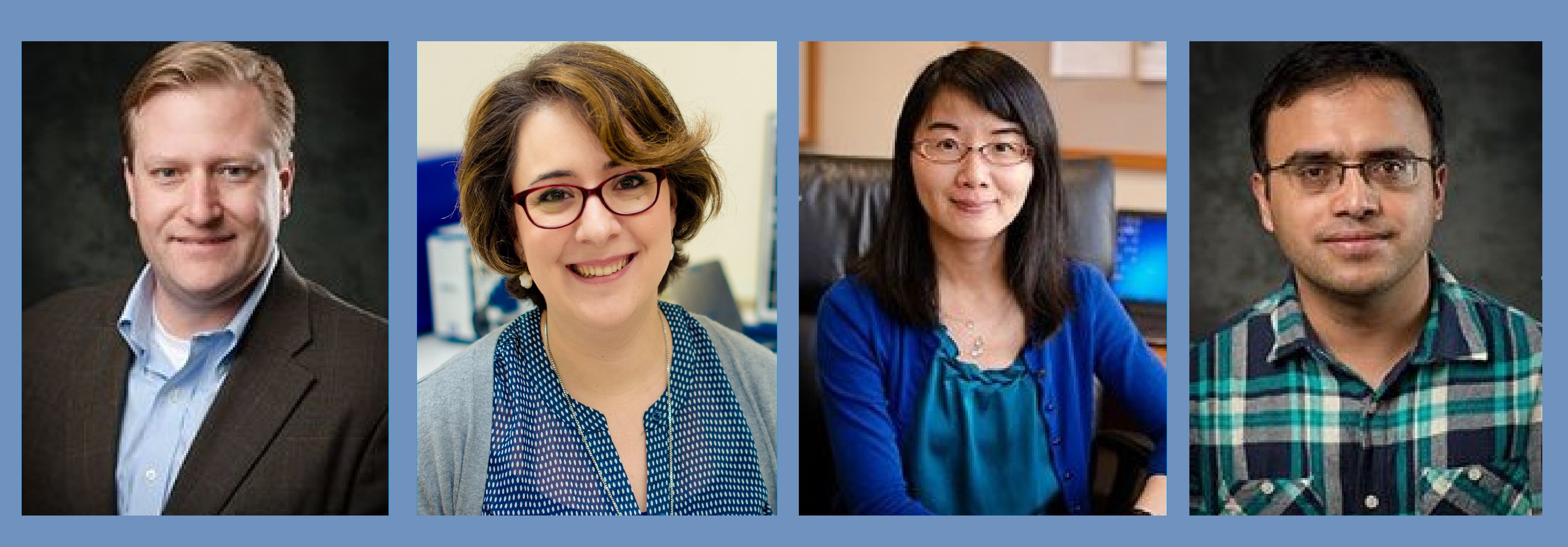 The life blood of any academic department is the faculty, and one of the keys to maintaining an intellectually healthy and vigorous faculty is the regular infusion of new talent and all the fresh ideas that come with it. I am happy to say that over the time that I have been here, the ECE Department has been fortunate to be able to bring in a number of new young faculty members, and doubly fortunate that they have been successful in so many different ways. Today I want to give a special shout-out to that side of our department.
The life blood of any academic department is the faculty, and one of the keys to maintaining an intellectually healthy and vigorous faculty is the regular infusion of new talent and all the fresh ideas that come with it. I am happy to say that over the time that I have been here, the ECE Department has been fortunate to be able to bring in a number of new young faculty members, and doubly fortunate that they have been successful in so many different ways. Today I want to give a special shout-out to that side of our department.
By way of background, for those not completely familiar with the U.S. system, at most universities there are three ranks of tenured and tenure-track faculty: Assistant Professor, Associate Professor, and Professor. Anyone with the word “Professor” in their title is expected to be recognized as a scholar in his or her respective field, and to be able to translate that scholarship into effective classroom teaching. The usual duties of someone in these ranks is said to include teaching, research, and service, and the allocation of time and efforts among these three legs of the academic stool can vary quite a bit. Assistant Professors are near the beginning of their academic careers; they usually hold the PhD degree and may have some prior experience such as a post-doctoral fellowship. They are said to be “tenure-track” meaning that they will be seeking tenure after some period of time, typically six years. Associate Professors are more mid-career, continuing on the successful path that was begun earlier, and perhaps exploring new ideas, research areas, and collaborations. Tenure, the guarantee of lifetime employment to successful faculty members, is usually granted at the time of promotion from Assistant Professor to Associate Professor. Professors are the well-established faculty members who have built a strong track record in research and teaching, and are recognized nationally and internationally for their scholarly contributions. Professors often take on leadership positions within in the department or the university as well.
In the ECE Department right now we have four faculty members at the rank of Assistant Professor. At this time last year we actually had seven, but three of those – Durdu Guney, Tim Havens, and Chee-Wooi Ten – we promoted from Assistant Professor to Associate Professor last spring. I was delighted that all three were able to run the tenure and promotion gauntlet and emerge successfully at the other end. I had thought that three in one year must be a record, until Martha Sloan informed me that she was in a group of six such faculty members many years ago! We are happy for this group, and they are continuing to make us proud just as I knew they would.
Our four current Assistant Professors, in no particular order, are Jeremy Bos, Lucia Gauchia, Zhaohui Wang, and Sumit Paudyal. It has been a great year for this group, and over the past month or so we have gotten some wonderful news which has prompted this week’s column. Collectively they have been awarded three early-career awards: two National Science Foundation (NSF) CAREER awards, and one U.S. Air Force Young Investigator Program (YIP) award. These awards give young faculty members the time and resources to build a strong foundation in research. Their success reflects a lot of hard work, definitely a lot of perseverance, and a little bit of good luck too. Fortune favors the prepared mind.
Dr. Jeremy Bos is a 2013 PhD graduate of our own program, working (then) under the supervision of Dr. Michael Roggemann in atmospheric and statistical optics. He continued in this line of research for two years under an Air Force post-doctoral fellowship on the island of Maui, before returning to Michigan Tech in 2015 to take up his current position. He is the recipient of a three-year Air Force YIP award, titled “Imaging Theory and Mitigation in Extreme Turbulence-Induced Anisoplanatism.” His research will help the Air Force to see objects over long distances through turbulent media, such as the atmosphere, which causes light paths to bend in unpredictable ways and wreaks havoc with conventional optics and image reconstruction. Jeremy also has a separate and practically unrelated technical interest area, namely robotics, control, and automation, which stems for his time as a engineer at GM prior to coming to graduate school. He is playing a critical role in helping the ECE Department develop a strategy for expanding our robotics programs, all the way from graduate research, to undergraduate teaching, to pre-college outreach. It’s like having two faculty members in one!
Dr. Lucia Gauchia came to Michigan Tech in 2013, originally from Spain and most recently (at the time) a visiting position at McMaster University, in Hamilton, Ontario. Her area of interest is in energy storage systems, which covers the different ways that we can store energy that has been generated electrically so that it can be used at a later time. Utilities and consumers need energy storage to balance the generation of electrical power with the demands of electrical loads – often the two are out of sync. Because energy conversion is of interest to both electrical engineers and mechanical engineers, Lucia holds a joint appointment in the ECE Department and the Department of Mechanical Engineering-Engineering Mechanics at Michigan Tech. She holds an endowed position, the Richard and Elizabeth Henes Assistant Professor of Energy Storage Systems. Her cross-listed graduate course in energy storage systems is increasingly popular each year, and she gets very high student course evaluations for it. Lucia is the recipient of an NSF CAREER award, titled “An Ecologically Inspired Approach to Battery Lifetime Analysis and Testing.” She plans to borrow ideas from lifecycle analysis and population dynamics to understand better the performance and potential failure modes of batteries and battery packs, an increasingly important component of utility power systems, automobiles, and a myriad of other applications of electrical power.
Dr. Zhaohui Wang also came to Michigan Tech in 2013, having just completed her PhD with a very successful group at the University of Connecticut. Her work is in underwater acoustic communication networks. She had originally came in on a “computer engineering” search, but she has proven herself to be an able contributor in signals and systems as well. She teaches courses in wireless sensor networks, detection and estimation theory, and for the first time this semester our required undergraduate course in communication theory. Because of her interest in underwater acoustics, she is a member of the Great Lakes Research Center (GLRC) and has a large and expanding laboratory there. Zhaohui is the recipient of an NSF CAREER award, titled “Online Learning-Based Underwater Acoustic Communication and Networking” which will support much of her research for the next five years. She plans to develop methods for communication among multiple underwater surveillance platforms that take advantage of real-time modeling of underwater acoustic communication channels, which are dynamic and can be very complicated. This is an ambitious project combining elements of communication theory, signal processing, and physics. I can’t resist mentioning that Zhaohui was featured on the cover of our 2015 annual report (my favorite cover ever) walking across the ice on Keweenaw Bay in the dead of winter, where she and her graduate students were drilling holes in the ice and carrying out under-ice acoustic communication experiments.
Dr. Sumit Paudyal is the senior member of this group of young faculty. He came to us in 2012 with a PhD from the University of Waterloo, in Ontario. His work is on the electrical power side of the ECE Department, by far the most popular area among our current MS students. His research and teaching area is in optimization and control of power systems. He is the lead Michigan Tech investigator on a project sponsored by ARPA-E (Advanced Research Projects Agency – Energy) in collaboration with the University of Vermont, titled “Packetized Energy Management: Coordinating Transmission and Distribution.” The aim is to improve the ways that power grids take advantage of multiple intermittent energy sources, such as solar panels and wind turbines, borrowing some ideas from packet-switched communication (the essential idea behind the Internet.) Sumit is an outstanding teacher, with large graduate classes and very high student course evaluations; in fact, he has been recognized by the university through induction into the Michigan Tech Academy of Teaching Excellence. I recently did a little back-of the-envelope calculation, and discovered to my delight that, considering tuition revenue, course evaluations, and research expenditures, Sumit has made himself the third most valuable member of the ECE Department!
I get to work with a lot of wonderful people every day – our faculty, our staff, and our students. These four are among the best. We are proud to call them our own here in the ECE Department, and I look forward to many years of a mutual rewarding relationship.
– Dan
Daniel R. Fuhrmann
Dave House Professor and Chair
Department of Electrical and Computer Engineering
Michigan Technological University
 This week the Deans’ Teaching Showcase returns to the College of Engineering. Dean Wayne Pennington has chosen Glen Archer, principal lecturer and associate chair in the Department of Electrical and Computer Engineering.
This week the Deans’ Teaching Showcase returns to the College of Engineering. Dean Wayne Pennington has chosen Glen Archer, principal lecturer and associate chair in the Department of Electrical and Computer Engineering.
Dan Fuhrmann (ECE chair), recommended Archer because of his long history of teaching EE3010, a service course primarily populated by other engineering majors.
Besides being very large (enrollment was 193 last fall), students tend to find the material difficult and perceive it as not directly related to their major. Despite these challenges, Archer earned an “Excellent Teacher” rating of 4.36 on a 5 point scale.
Fuhrmann wrote, “In addition to this traditional teaching assignment, Glen also teaches students in a wide variety of less formal venues. Glen serves as a mentor to two Enterprise groups. He has been a long-time advisor of Blue Marble Security. Recently, as an overload, he enthusiastically embraced adding the Robotics Systems Enterprise and has already grown membership in that enterprise from five to 30 students.
“Glen also leads departmental efforts to assemble course offerings and the binder process for the department. He also assigns and mentors the graduate teaching assistants in ECE, and has been known to have them to Thanksgiving dinner at his home in some years.
“But when asked about his favorite parts of teaching, it’s his mentorship of his Enterprise students, especially as they lead a substantial outreach program in ECE. Through Summer Youth Programs, Upward Bound and other programs, Archer’s team hosts hundreds of pre-college students annually. Glen says he ‘couldn’t be prouder’ of the work these teams are doing. He also cites a recent win and third place finish in international competitions for the Blue Marble Security team.
“Finally, Glen measures his success by ‘hearing from students that what they learned in EE3010 was useful in their senior design projects. That’s what helps me get up in the morning.'”
Fuhrmann says “I think that Glen is terrific, and I don’t know what I’d do without him.”
But given Archer’s student focus, perhaps the best endorsement in his unique teaching capacity comes from a Reddit.com review by an anonymous student. “I’m not an EE so I had him for circuits for non believers, and man is he funny. He is also super helpful. He sets up online help groups, encourages participation, suggests going to his hours, and suggests going to the help center. He’s a really good professor and teaches the material well.”
Archer will be recognized at an end-of-term luncheon with 11 other showcase members, and is now eligible for one of three new teaching awards to be given by the William G. Jackson Center for Teaching and Learning this summer recognizing introductory or large-class teaching, innovative or outside the classroom teaching methods, or work in curriculum and assessment.